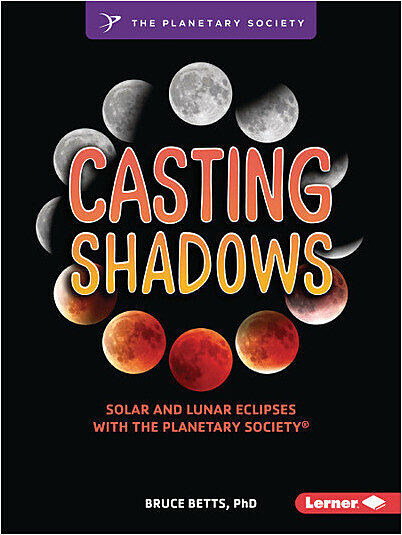The Planetary Society • Jan 16, 2024
Casting Shadows: Solar and Lunar Eclipses with The Planetary Society
A new book about eclipses for kids
The Planetary Society is proud to announce a new kids book all about eclipses, written by our chief scientist, Dr. Bruce Betts, with an introduction from our CEO, Bill Nye.
Aimed at reading levels for grades 2 through 4, “Casting Shadows: Solar and Lunar Eclipses with The Planetary Society” introduces kids to the different kinds of eclipses, when they happen, how to watch them, and cool things to look out for during an eclipse.
“Casting Shadows” is the first release in a publishing partnership between The Planetary Society and Lerner Books to create a series of 15 kids books on space and science. To spark young minds, these books will all be made available to kids at no cost through school libraries across the United States. Stay tuned to hear more about the following books in this series.
Planetary Society members get a 25% discount when they purchase their own copies of “Casting Shadows” at the link below.

Reviews
“Bill Nye’s opening note is only the first incredible detail that will captivate the attention and imagination of young readers. . . Perfect for intermediate science lessons and a useful update for existing library collections; the large format images make it especially appealing.” — School Library Journal
“Using simple, straightforward language, vocabulary words defined within the text, and clear, helpful illustrations, Bill Nye and the Planetary Society invite young readers to learn about solar and lunar eclipses. The explanations of how people on earth see shadows created when either the moon or our planet gets in the way of the sun's rays are easy to grasp, and carefully chosen photos and diagrams reinforce concepts. There are brief historical interludes, such as sidebars on Copernicus or how ancient Greeks deduced that the earth was round based on the shape of earth's shadow, but the overall emphasis is on the regularity of eclipses and safe ways of viewing them. The section on why certain eclipses can only be seen from limited places on earth brings the content full circle, reminding readers that the moon is constantly moving, creating a sense of wonder. There's a glossary and brief list of resources that will be helpful for report writers, and emerging and newly independent readers will appreciate the inviting and accessible content.” — Kathleen McBroom
“The text blocks are kept small and straightforward so that the information doesn’t overwhelm readers. The result is impressively clear and efficient—the level of detail will satisfy advanced readers, while the digestible format will be welcoming to reluctant or hard-to-please readers. The author’s enthusiasm shines through clearly and is contagious. Sure to excite a new generation of stargazers and scientists.” — Kirkus Reviews
About the author
Dr. Bruce Betts is Chief Scientist and LightSail Program Manager for The Planetary Society, the world's largest space interest group. Dr. Betts is a planetary scientist who earned a B.S. in physics and math, an M.S. in Applied Physics from Stanford, and a Ph.D. in Planetary Science with a minor in Geology from Caltech. He spent several years with San Juan Institute/Planetary Science Institute as a Research Scientist, and later Senior Research Scientist. Dr. Betts is the author of “Astronomy for Kids: How to Explore Outer Space with Binoculars, a Telescope, or Just Your Eyes!” and several other books about space with audiences ranging from pre-school to high school. He regularly writes for The Planetary Society member magazine The Planetary Report, and at planetary.org.
Let’s Go Beyond The Horizon
Every success in space exploration is the result of the community of space enthusiasts, like you, who believe it is important. You can help usher in the next great era of space exploration with your gift today.
Donate Today

 Explore Worlds
Explore Worlds Find Life
Find Life Defend Earth
Defend Earth

